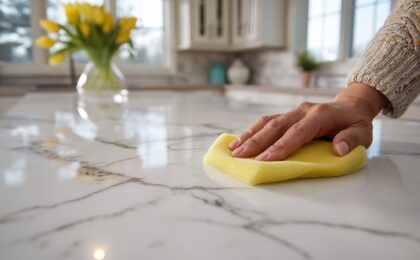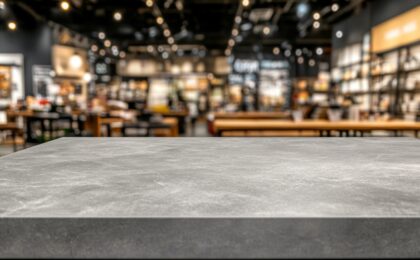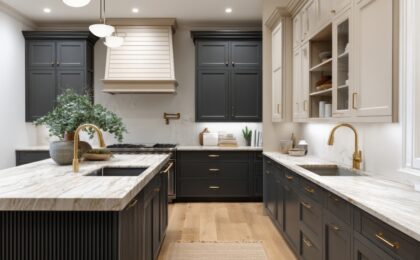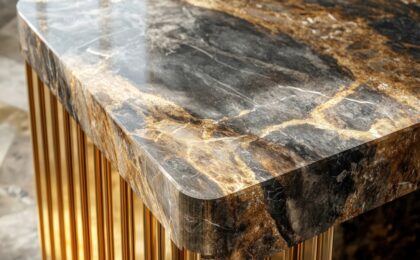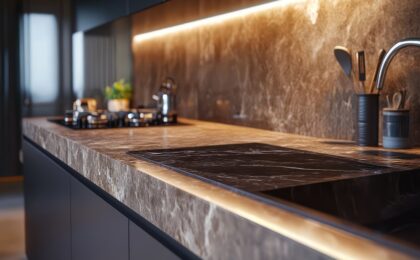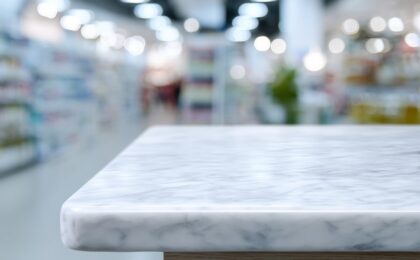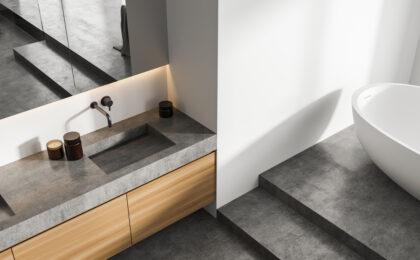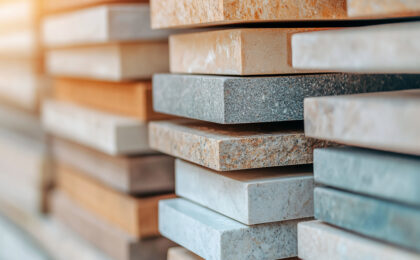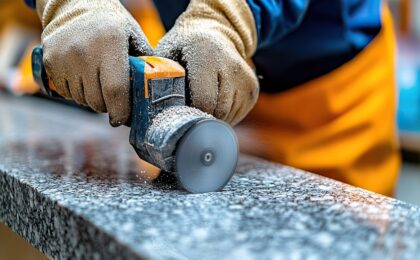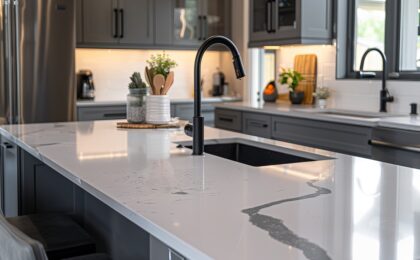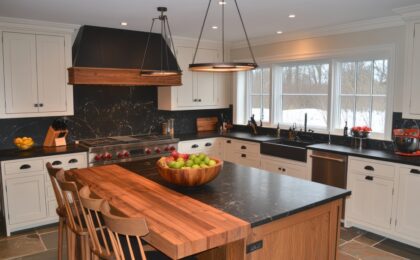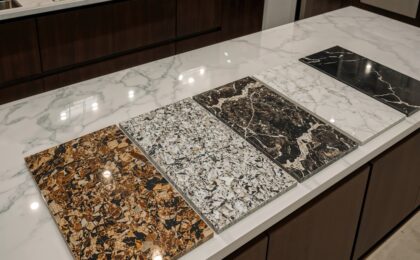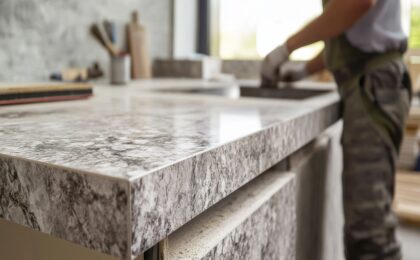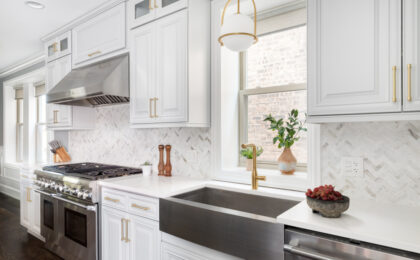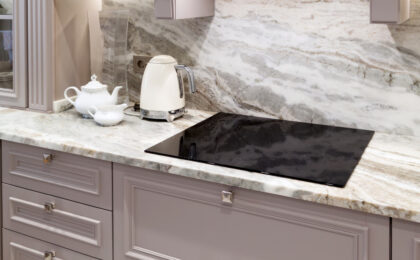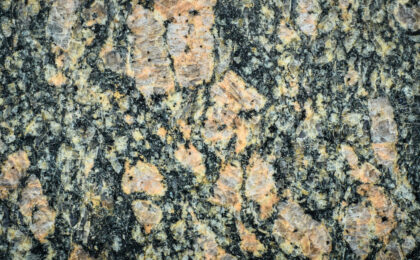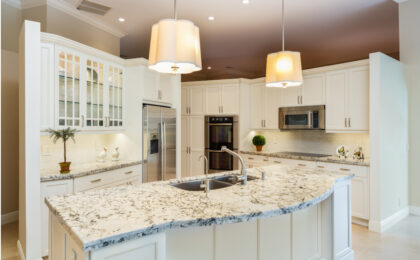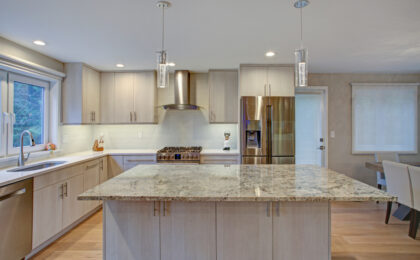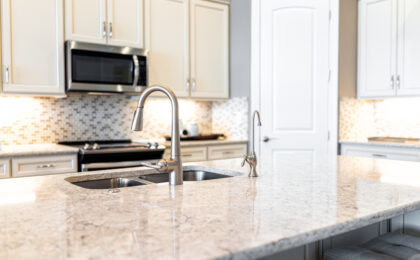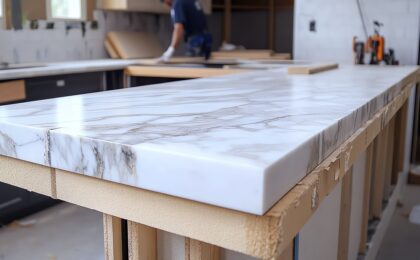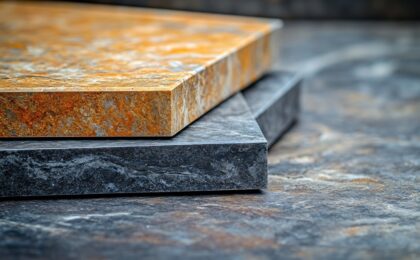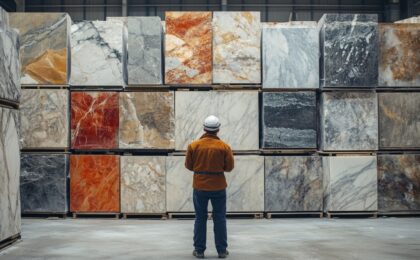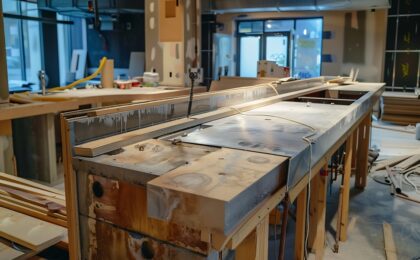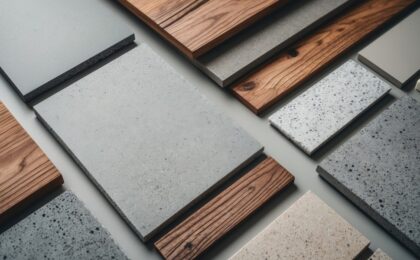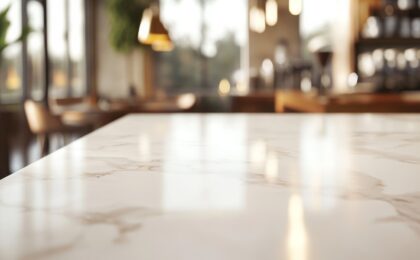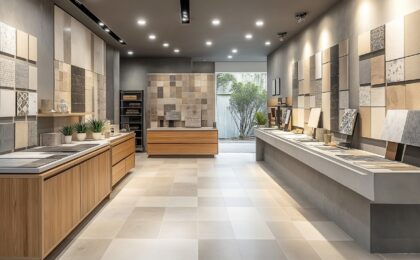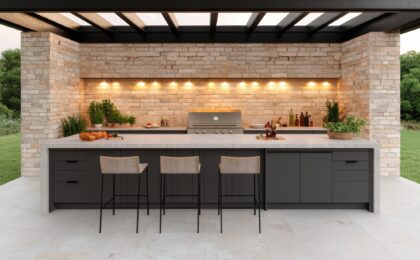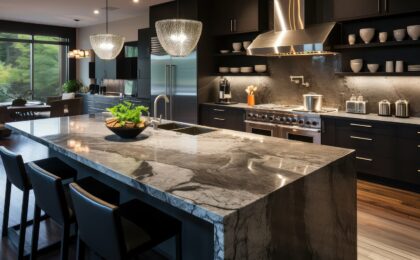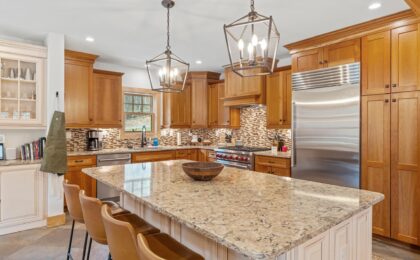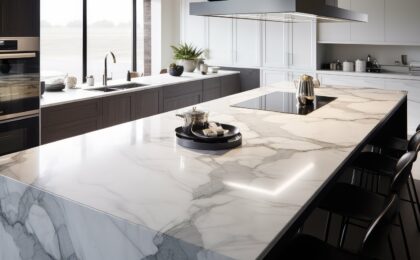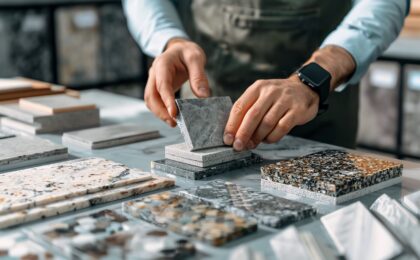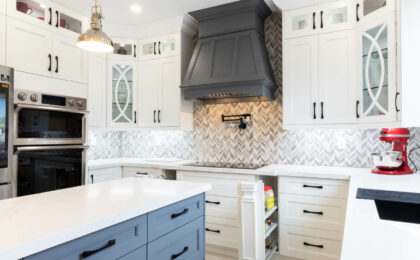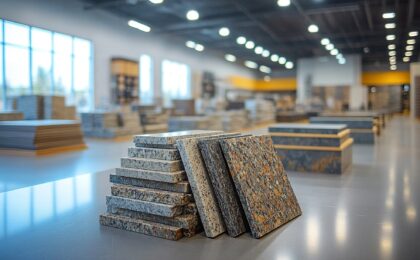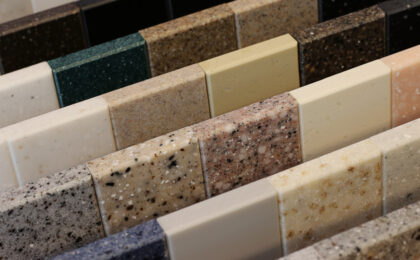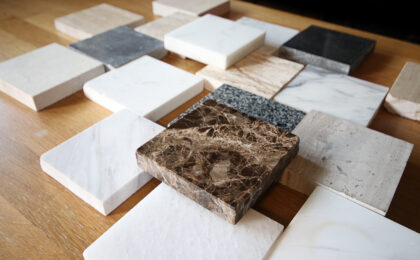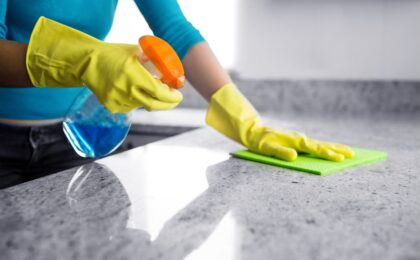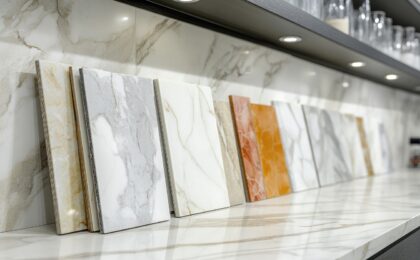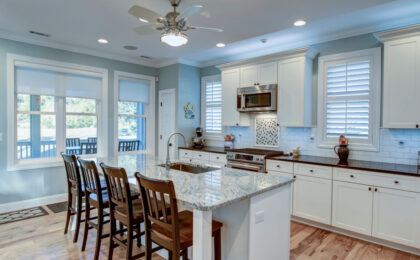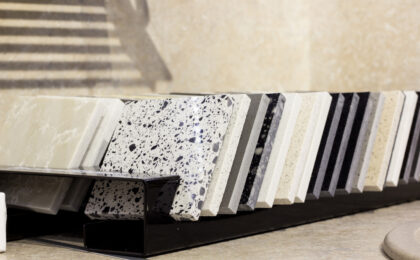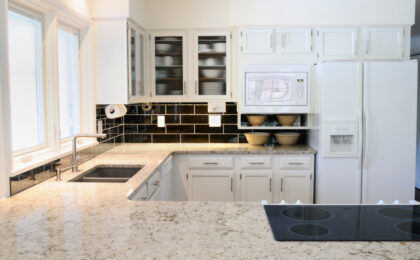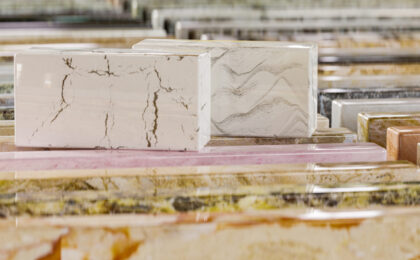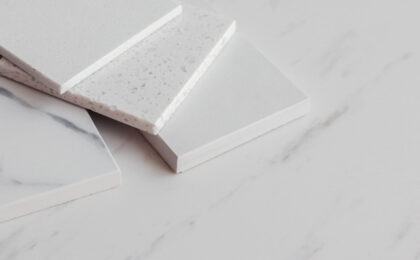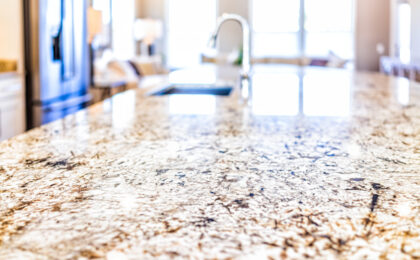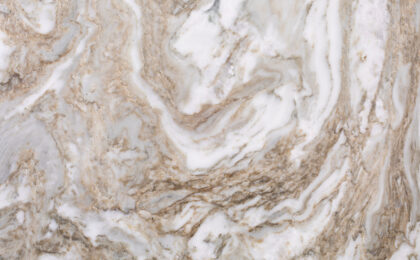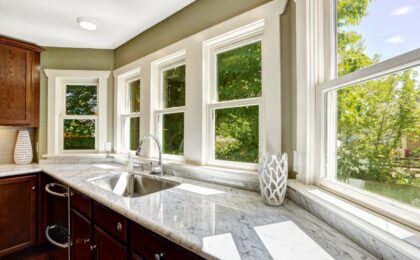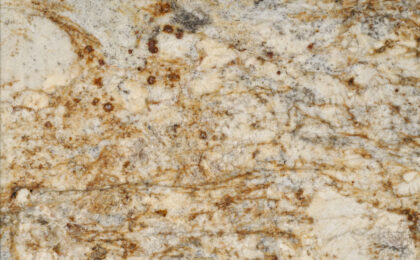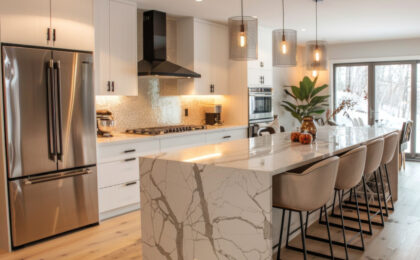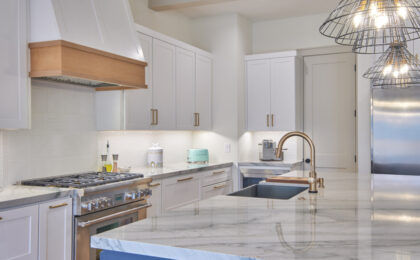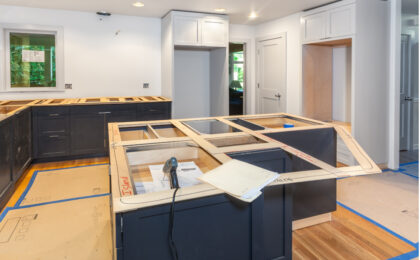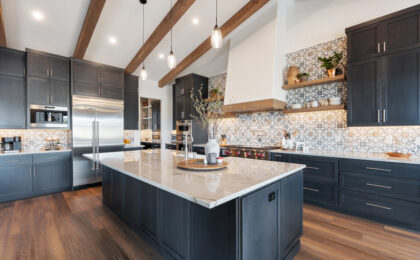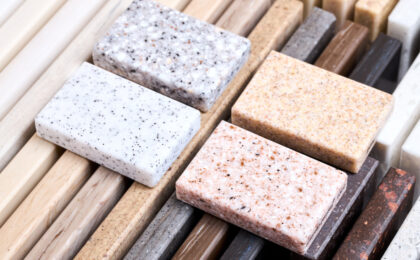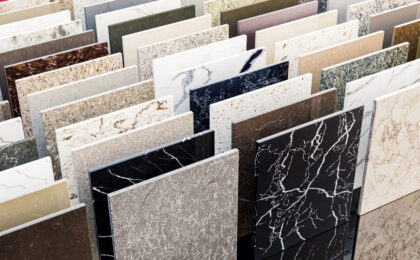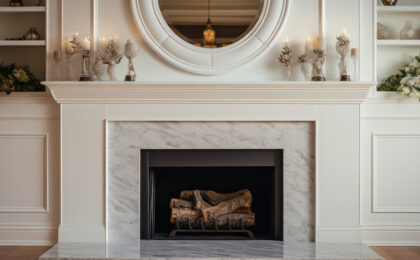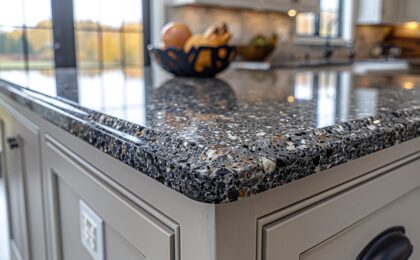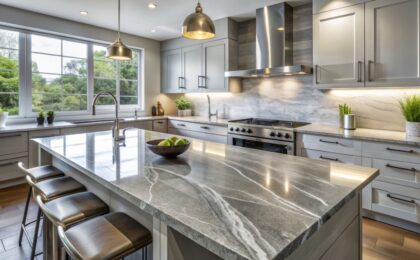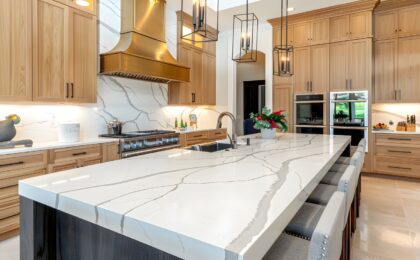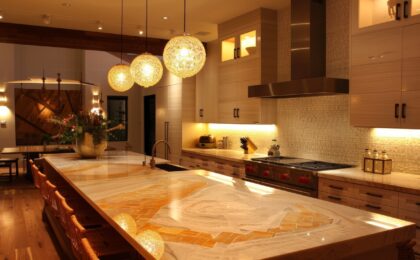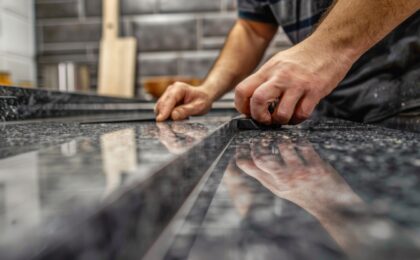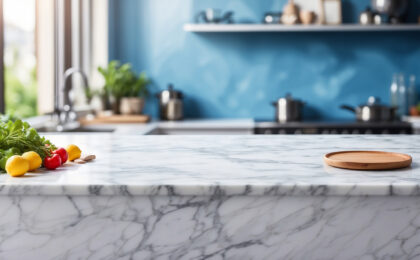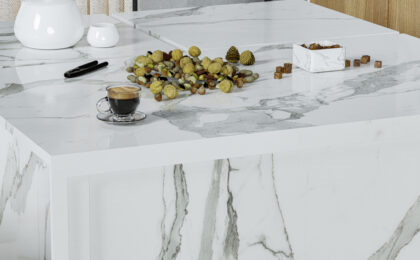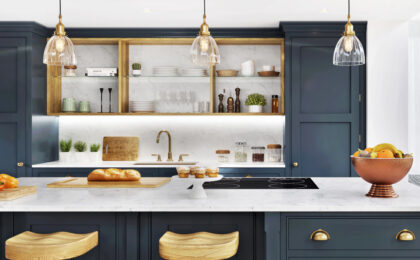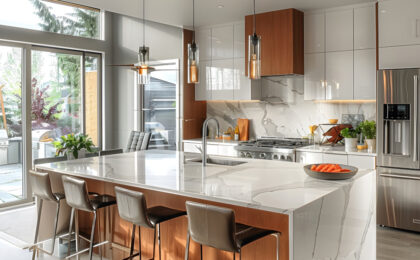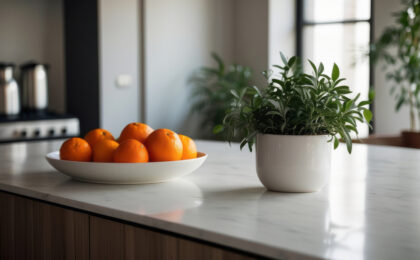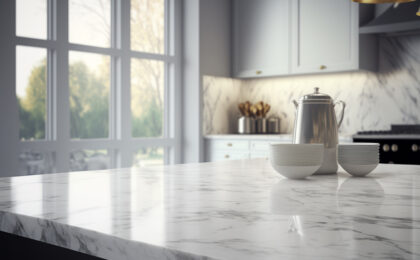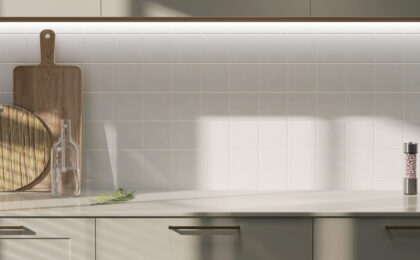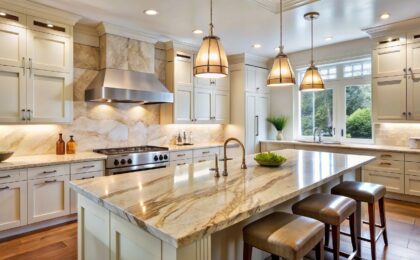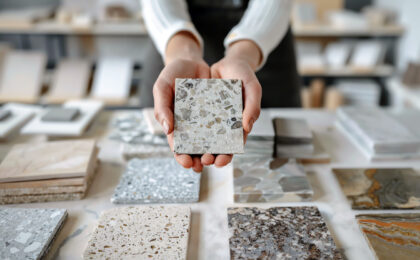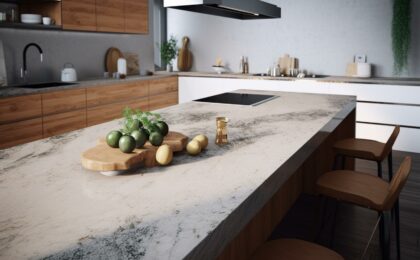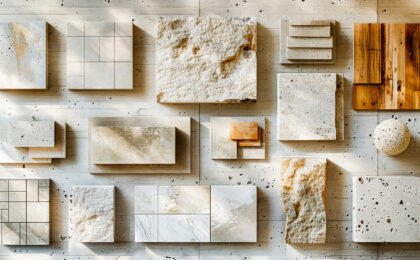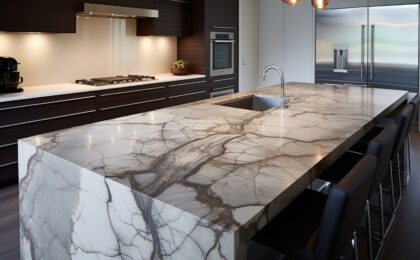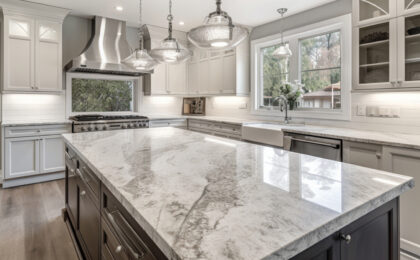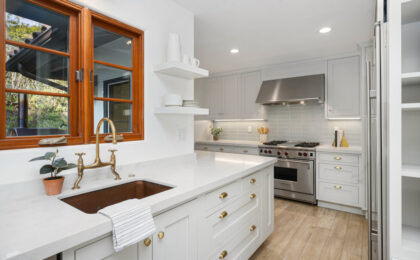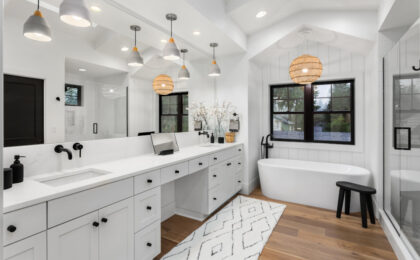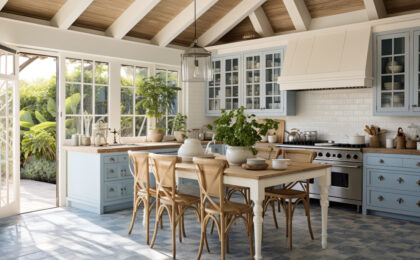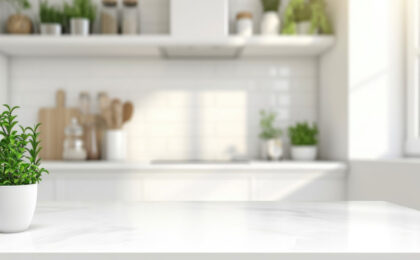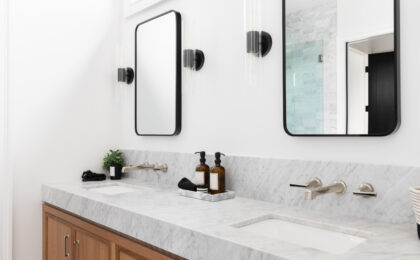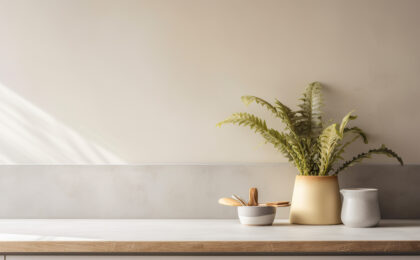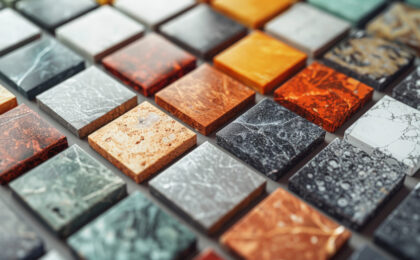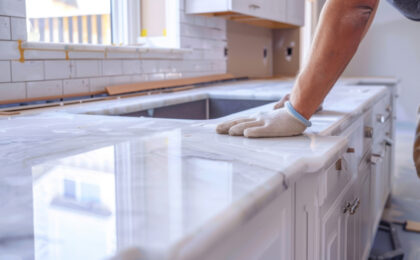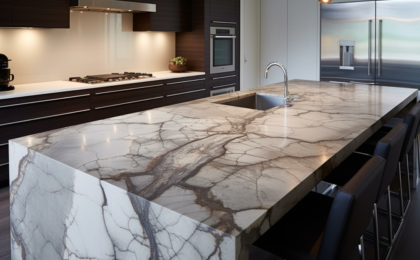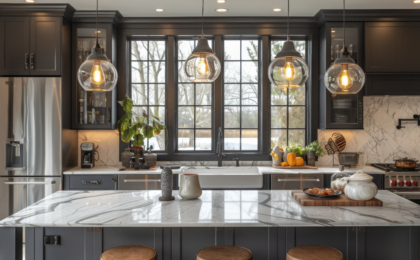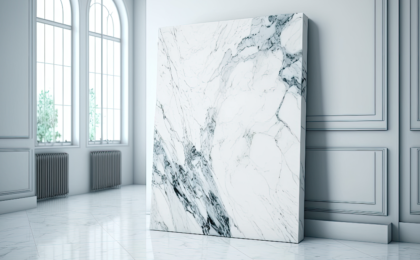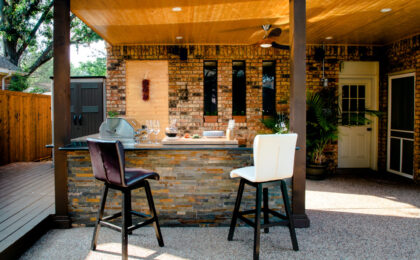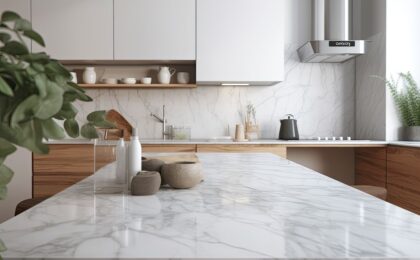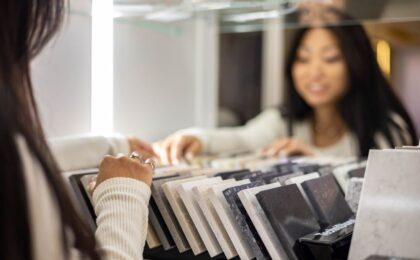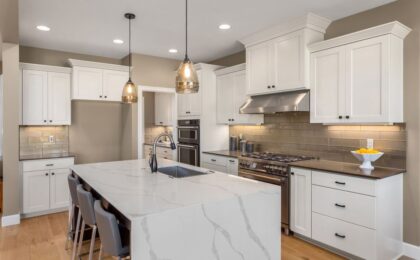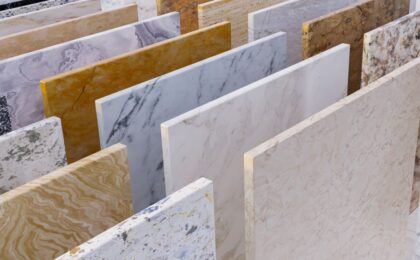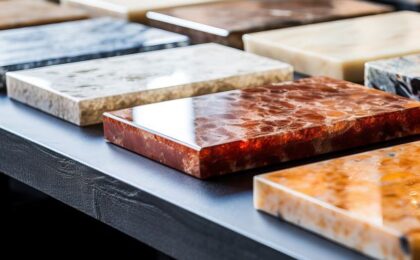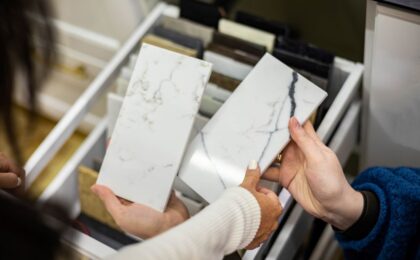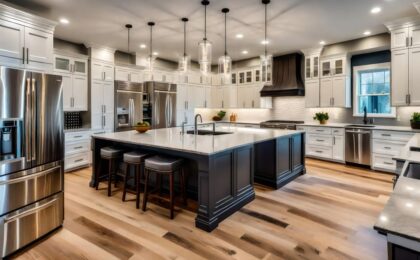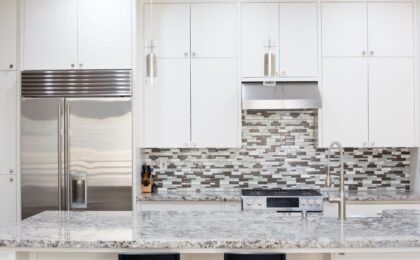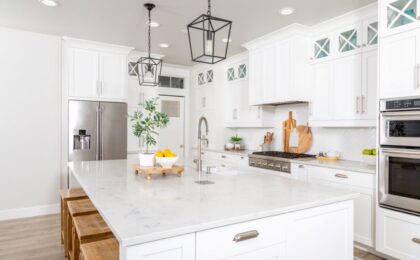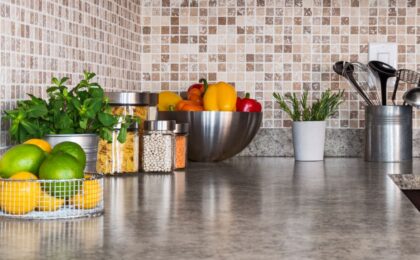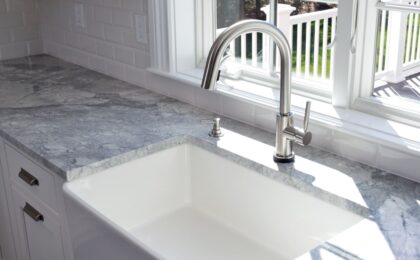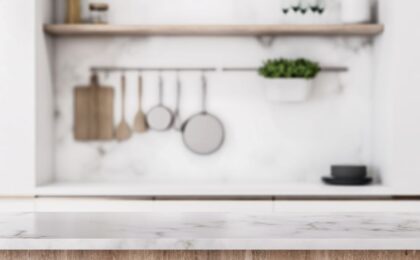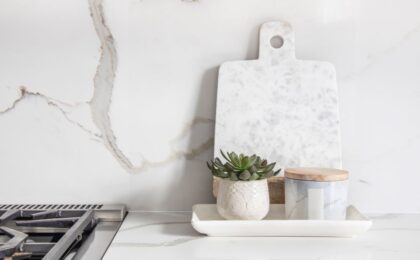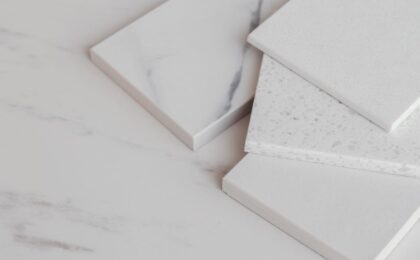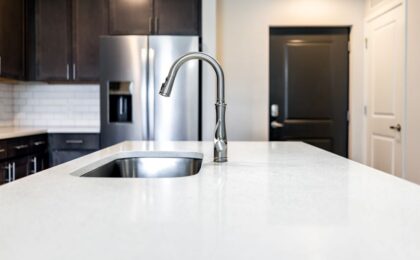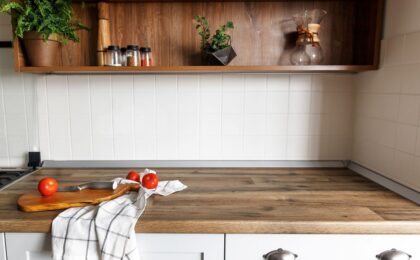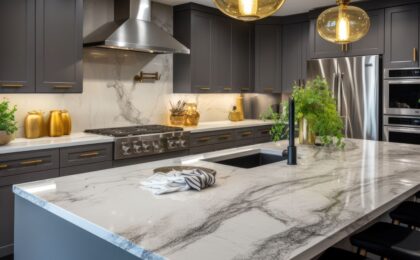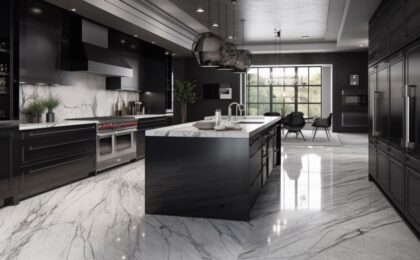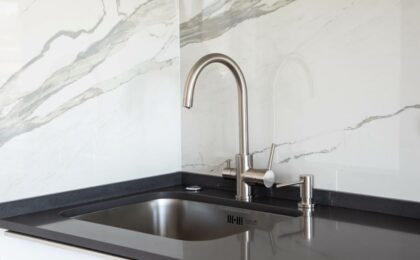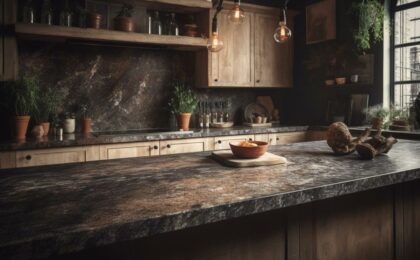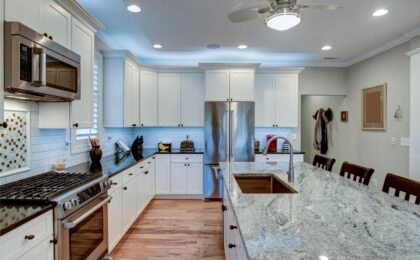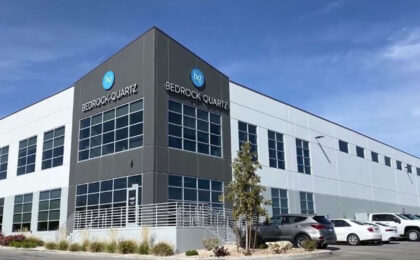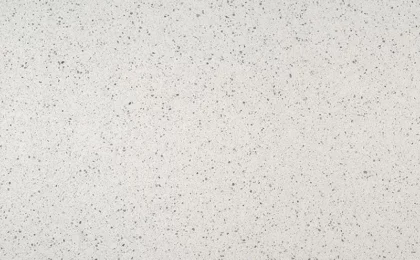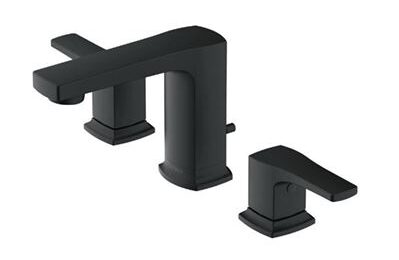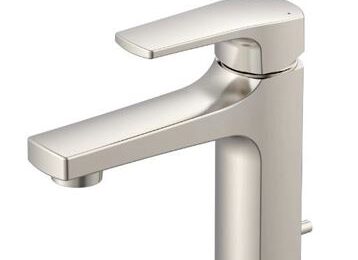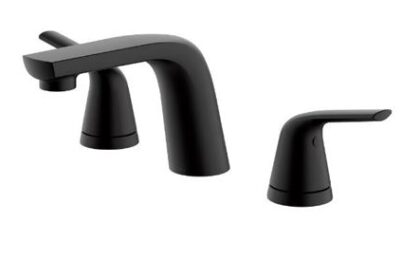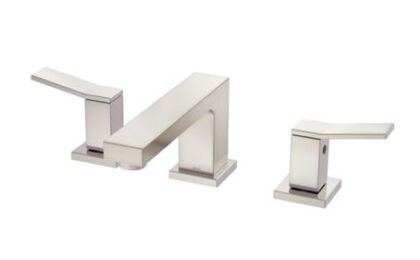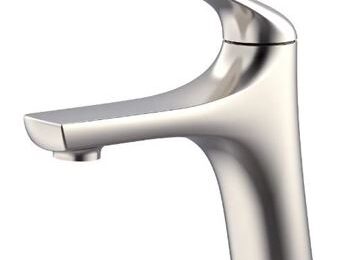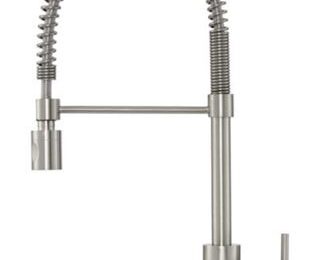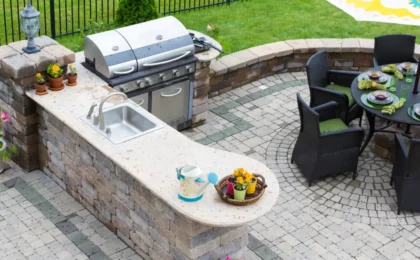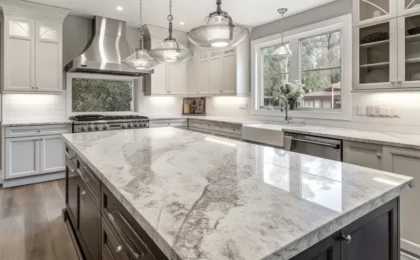Quartz and soapstone are two popular materials for kitchen countertops. Here at Bedrock Quartz, we don’t do soapstone. We do quartz countertops, along with marble and granite, and we do it quite well. Do you know the difference between quartz and soapstone as a countertop material?Actually, the differences are many and varied. Yet the most prominent difference between the two is this: while both quartz and soapstone are natural materials, quartz countertops are manufactured products while soapstone countertops are not. Allow us to explain.How Quartz Countertops Are MadeQuartz is a naturally occurring mineral found most bountifully in silica sand. Every quartz countertop starts out as a load of sand from which the quartz needs to be separated. The quartz is then mixed with a variety of resins that hold everything together and provide the desired color and veining. Finally, the material is formed into slabs.Manufacturing quartz countertops is necessary because, on their own, small quartz pieces would not hold together. In addition, the manufacturing process offers the ability to create countertops in just about any color. Even veining can be customized to achieve the perfect look every time.If that’s not enough, a variety of resins can be mixed and matched to achieve different kinds of products. Resin choice can affect everything from the finished look to how easy a quartz product is to work with. You simply get a lot of variability with quartz.How Soapstone Countertops Are MadeSoapstone is a naturally occurring stone made up largely of steatite and talc. It is found around the world in places like India, Brazil, and the U.S. It’s extracted from quarries just like marble and granite. Every soapstone countertop begins its life as a block of quarried stone.The block is literally cut into individual slabs. Then the slabs are further cut and polished in preparation for installation as countertops. Contractors measure soapstone countertops to fit, doing the final cuts on site.As you might imagine, you don’t get as many options with soapstone. Samples extracted from soapstone quarries can vary from one to the next, but you don’t have the ability to create an unlimited number of colors and visual textures. A slab is what it is.Both Have Their Pros and ConsIf you are thinking that both quartz and soapstone have their pros and cons, you’re absolutely right. One of the biggest advantages quartz countertops have is their durability. They can withstand an awful lot. It is no stretch to say that quartz countertops are the most durable among all stone materials.You don’t ever have to seal quartz. You do not have to worry too much about staining. You’ll want to be careful with hot pots and dishes, just because doing so is a wise idea. But it is not likely that a quartz countertop will ever be damaged by a hot pot.Soapstone doesn’t have to be sealed either. It is also pretty resilient in terms of staining and heat resistance. The big downside to soapstone is that it scratches very easily. You can take the scratches out with a little bit of sanding. However, you’ll change the look of the surface. That means you will not have an even surface across the entire countertop.The Choice Is YoursQuartz and soapstone are two countertop materials homeowners seem to want right now. If you are looking to install new countertops in your kitchen, the choice is ultimately yours. If you prefer quartz, and we hope that this is the case, feel free to visit any of our Utah showrooms. You’re going to love our quartz products.
Quartz Countertops vs. Soapstone
YOU MAY ALSO LIKE
You love your marble countertops. They exemplify the classic aesthetic you have worked so hard to achieve in your kitchen. And yet, all it takes is one stain to ruin everything. You do your best to make sure your marble countertops are well cared for. But what do you do if one does get stained? […]
Stone countertops can be described according to any number of unique characteristics. Hardness and density are the two characteristics our installers prefer to highlight. Both impact countertop longevity. If you need to choose, is one more important than the other? Not necessarily. Let us talk about hardness and density, and what they mean to stone […]
We often talk about stone countertops in the context of home value. As the thinking goes, stone materials are a better choice in terms of increasing your home’s value. They become investments through which homeowners expect to enjoy some sort of financial return. But is the return on investment (ROI) more than just financial? Countertops […]
We sometimes wonder how many Utah homeowners are missing out on the beauty and luxury of marble countertops because they mistakenly believe the myth that marble is a nightmare to care for. It’s a myth we find ourselves routinely dispelling in our showrooms. In fairness, marble requires a little more maintenance and care than quartz. […]
Bedrock Quartz customers have choices when it comes to edge profiles. They don’t have to settle for a simple squared edge that seems out of place within the grand scheme of things. We offer multiple choices, all of which can be seen by visiting any of our Utah showrooms. Let’s look at three such choices: […]
One of the biggest challenges of choosing a quartz countertop is deciding on a color. Because quartz is a manufactured product, it can be made to look like just about anything. From solid colors to patterns that mimic natural stone veining, you can literally get quartz that looks like anything you can imagine. So, what […]
It is a given that natural stone is a more expensive countertop material than manufactured wood and laminates. You could pay considerably more for something like granite, marble, or quartzite. Even quartz is on the higher end. So what makes stone so expensive? First and foremost, you need to know that an investment in stone […]
Stone countertops can do wonders for a modern kitchen or bath. Whether you prefer a natural material like quartzite or a manufactured quartz product, taking the time to make an informed decision never hurts. There is no need to rush into a choice given the amount of money you could invest in stone countertops. Most […]
We talk an awful lot about natural stone countertops for the kitchen. And why wouldn’t we? Stone countertops are our specialty. But did you know that most of the benefits of installing stone in the kitchen carry through to the bathroom? For so many of our customers, beauty is the central motivation for choosing stone […]
Nothing beats the look of a natural stone countertop in the modern kitchen. Countertops featuring quartzite, marble, and granite look absolutely stunning. But here’s the thing: not paying attention to slab layout could lead to a noisy visual flow. That’s not something most people want when investing in stone. So how do you achieve the […]
If you follow our blog, you know that we recommend professional installation for all countertops. You also know that we install everything we sell. Professional installation is the best way to guarantee a timely and high-quality project. Speaking of timeliness, have you ever wondered how long installation takes? People frequently ask us about installation times. […]
Have you ever visited a Bedrock Quartz showroom and left wondering how an enormous block of stone ultimately becomes a luxury countertop in a modern home? Welcome to the world of stone countertop fabrication. It is something we think about all the time. We obviously know the process inside and out. But we also understand […]
Quartzite has become one of the hottest countertop materials in recent years. For many reasons, homeowners seem to love it. We carry it in all our Utah showrooms because local homeowners are just as crazy about it. But like all natural stone materials, quartzite needs a certain amount of TLC. A Word About Quartzite The […]
Natural stone and quartz countertops are our specialty at Bedrock Quartz. And although we are not interior designers by trade, we know a thing or two about choosing a countertop material that nicely complements the kitchen. For some of our customers, the biggest challenge is how to combine each of our stone surfaces with different […]
Did you know that climate has a very real impact on residential and commercial structures? Everything from precipitation to temperature and humidity can affect how a home performs over many decades. It is not something people tend to think about when choosing countertop materials. We aim to change that. Choosing the right countertop material for […]
With 2025 more than half gone, we have noticed an interesting trend among Utah home buyers looking to install new countertops. It is a trend we truly appreciate here at Bedrock Quartz. What is it? Mixing stone countertops with butcher block. The combination creates a complex and thought-provoking aesthetic. Combining butcher block with material like […]
Do you get a kick out of loaded questions? If so, we have a good one for you. Which is better: covering old laminate countertops with contact paper or replacing them with new countertops? It is a loaded question because natural stone countertops are our business. Of course, we would prefer that you invest in […]
Smart home technology is all the rage these days. Younger homebuyers are especially fond of it. But even millennials and Gen Xers are embracing smart home tech to some degree. That being the case, we are no longer surprised when a customer asks whether the technology can be integrated with stone countertops. The simple answer […]
We expect customers visiting our Utah showrooms to think about long-term costs. After all, new stone countertops represent a significant financial investment. Our customers want to know what today’s investment will mean for the bottom line 10 or 20 years down the road. Obviously, none of us can predict what will happen decades in the […]
New countertops for the kitchen and bath can represent a significant financial investment. It is easy to spend a lot of money on countertops you ultimately love. But it’s just as easy to spend a lot of money and still end up with nothing but regret. We operate multiple showrooms throughout Utah to assist customers […]
We carry a nice selection of natural stone slabs in all our Utah showrooms. But we also offer quartz, a manufactured stone material. It is a less expensive alternative to materials like marble, granite, and quartzite. Best of all, it is versatile in terms of aesthetics. You can get a quartz countertop in a solid […]
It is common to hear stone countertop dealers talk about hardness and density. Stone countertops are known for both. But if you really want to know what is going on under the surface of that natural stone material, it’s important to note that hardness and density are not the same thing. Hardness and density are […]
Homeowners interested in new countertops made of anything other than wood and laminates still have plenty of choices. Here at Bedrock Quartz, we specialize in natural stone. Our showrooms offer a complete range of marble, granite, quartzite, and quartz. We do not dabble in concrete countertops. We mention concrete because some people believe it is […]
People write all sorts of things about granite countertops. You could spend all day browsing online articles and still never cover them all. The good news is that much of what you read would be true. The bad news is that there are still plenty of myths floating around. We want Bedrock Quartz customers to […]
One of our previous blog posts discussed how the size and weight of stone countertops makes their installation challenging. Truth be known, stone is heavy. But there is another side to the weight coin, a side we want to explore in this post. What is this other side? The fact that stone countertops can support […]
We have been providing Utah homeowners with marble and granite countertops since our company’s inception. Through the years, we have noticed two specific words that are often used to describe marble and granite: classy and elegant. You will see them throughout the industry utilized in product descriptions, marketing materials, web content, etc. The interesting thing […]
One of the benefits of working with Bedrock Quartz is the fact that we install everything we sell. Moreover, we encourage our customers to choose professional installation over DIY. Materials like marble and granite are extremely heavy. The combination of weight and size makes installation challenging – even for experienced installers. DIY installation isn’t recommended. […]
Have you seen those home improvement TV shows? The ones in which every new project begins with slamming a sledgehammer through a wall? The sledgehammer makes for great TV. However, it is not a tool you will see pros use that often. You certainly don’t need one to remove old countertops to prepare for installing […]
You’ve been thinking about new countertops for a while. Your current countertops are laminate, and they are showing signs of wear. They might even be damaged in some spots. But should you repair them rather than investing in replacements? We cannot answer that question for you. However, we can invite you to visit a Bedrock […]
Visiting a Bedrock Quartz showroom and picking out a stone slab marks the beginning of revitalizing your kitchen with new marble, granite, quartzite, or quartz countertops. Schedule permitting, and the installation date could be sooner than you anticipated. But between your visit and actual installation, there is an intermediate step known as templating. Fabricators in […]
Homeowners can be pretty creative when remodeling the kitchen. We have worked with several clients whose design plans included installing an island complete with a sink. Island sinks are not necessarily a new feature, but they seem to be catching on. Are you thinking about installing new countertops? And if so, is an island sink […]
We love working with customers looking for the perfect countertops for that new or remodeled kitchen. Our materials include quartzite, quartz, marble, and granite. Above and beyond choosing the right countertop material, our customers are faced with the question of whether to install a backsplash. Does your current home boast a backsplash in the kitchen? […]
We love outdoor kitchens here at Bedrock Quartz. Though our main priority is selling and installing quartz, granite, marble, and quartzite countertops, a part of our business is also devoted to assisting customers with outdoor kitchens. Outdoor kitchens and Utah’s natural beauty seem like they were made for one another. An outdoor kitchen certainly adds […]
How many people walk into the local showroom expecting their new countertops will be installed and ready to go a week or so later? New countertops that fast are virtually unheard of in Utah. Unless, of course, homeowners choose Bedrock Quartz for both sourcing and installation. We take immense pride in being a one-stop shop […]
Kitchen countertops have a dual role. They are functional in that they offer workspace in the kitchen. But they are also aesthetic in the sense that they contribute to the overall look and feel of the kitchen space. So of course, you are going to want to illuminate the brand-new granite countertops you purchase from […]
In our industry, there is a question that ranks right up there with, “which came first, the chicken or the egg?” The question is how to match new kitchen countertops with the overall kitchen design. Unfortunately, there is no black-and-white answer to the question. There are too many variables in play. It is one thing […]
Stone countertops are a beautiful addition to any kitchen. Materials like granite, marble, and quartzite can make an already beautiful kitchen absolutely stunning. But whenever you are working with natural stone, you need to ensure that installation is done correctly. That includes the use of structural supports. Proper structural support is critical for materials like […]
Bedrock Quartz has been supporting Utah homeowners with high-quality countertops and professional installation for nearly 50 years. Furthermore, we have remained an industry leader because we believe in giving customers the absolute best. As a Bedrock Quartz customer, you deserve certain things. Whether you get them from other providers is not for us to say. […]
Have you been burned by someone in the construction trades? Unfortunately, it happens. Yet we make a point of ensuring it does not happen to our customers. For example, we offer ‘no surprises’ pricing and installation. You get exactly what we promise you in the showroom. If you ever feel you are getting less, you […]
Search online for the best countertop materials for busy kitchens and you will find no shortage of articles pointing you to quartz. Countertop dealers, installers, builders, and interior designers highly recommend quartz countertops. They seem specifically designed for busy families who frequently use their kitchens. Natural stone products are good for busy kitchens too, but […]
We are pretty proud of the fact that we operate showrooms throughout the state of Utah. But we don’t do it for us. We do it for you. Our showrooms provide a place for you to come and see our beautiful and durable countertops for yourself – before making a choice. If seeing is believing, […]
It’s easy to be so captivated by the beauty of a quartz countertop that you don’t stop to think about everything that went into making it. For instance, when was the last time you considered the journey a quartz slab takes from raw material to finished countertop? It’s quite a story. Having the chance to […]
Congratulations on your choice of quartzite for your new kitchen and bath countertops. Quartzite is a fantastic material that offers a great combination of durability and aesthetic beauty. We hope you are planning on professional installation, but if not, there are things you should know before you attempt to do it yourself. Professional installation is […]
Wood has been a staple building material in the U.S. for as long as most of us can remember. As a result, it is easy to assume that humans have always built structures primarily with wood. That would make stone countertops a relatively new concept by comparison. But it turns out that the stone countertop […]
Stone countertops are a big hit with Utah homeowners due to stone’s durability and aesthetic beauty. In many ways, even an unprocessed slab of quartz, granite, or quartzite offers advantages you just don’t get from wood and concrete. But quality is still a concern among homeowners, and rightly so. A lot goes into ensuring the […]
Concrete countertops are fairly common in the American southwest. They are also making their way into the midwest region as well. Durability and customization are their appeal. But are they better than natural stone countertops? That is a matter of perspective. We prefer natural stone materials including quartzite, marble, and granite. Quartz isn’t a bad […]
Regular readers of the Bedrock Quartz blog know that quartz countertops are not 100% natural stone. They are a manufactured product consisting of quartz minerals, resins, and pigments. Modern manufacturing methods owe a lot to a 50-year-old process rooted in Bretonstone technology. The Bretonstone manufacturing process was invented by Breton S.p.A. in the early 1970s. […]
If anything positive came out of the COVID pandemic, it is the greater awareness everyone seems to have about germs. We have noticed this greater awareness among customers concerned about their countertops harboring bacteria. Bacteria is a real concern in the kitchen. After all, the kitchen is the place where we prepare our food. The […]
Some Bedrock Quartz customers have chosen to install new kitchen countertops because they want a change. Others are remodeling the kitchen. But then there are others who come to us because they feel they have no other choice. They have looked around the kitchen and determined that new countertops are no longer an option. Are […]
Laminated countertops are a good option for a certain segment of the buying population. But what if you purchased a house with laminate countertops that are now showing signs of delamination? It seems to us that they are good motivation to make the switch to stone. One of the upsides of laminates is their cost. […]
Part of our responsibility to customers is to keep an eye on kitchen design trends to ensure we have the right products in stock. Leading up to the start of 2025, there were several prominent trends in play. We are now a couple or so months into the new year. Here is what we are […]
When it comes to designing a custom fireplace, the material you choose plays a crucial role in both functionality and aesthetics. While marble, granite, and quartz are popular options, quartzite is emerging as a standout choice for homeowners in Salt Lake City and across Utah. Although quartzite is relatively new to the scene, it has […]
Among the many reasons we recommend professional countertop installation is the fact that stone countertops are so heavy. And by the way, this isn’t just a Utah thing. Countertop dealers across the country tend to recommend professional installation as a matter of course. As for countertop weight, customers have asked us why materials like granite […]
Quartzite is one of the materials we offer here at Bedrock Quartz. It is aesthetically beautiful as well as being strong, durable, and fairly easy to take care of. Cleaning up is not a big deal either. In fact, no special cleaner is required for quartzite countertops. But one is still recommended. What is quartzite? […]
Although not the end of the world, investing in marble countertops only to have them discolor can be a real downer. You put so much time and money into creating a beautiful kitchen you can be proud of. But one day you suddenly notice some discoloration in your countertops. Not good. Do you know what […]
The Bedrock Quartz team is committed to making sure that every customer is completely satisfied with the natural stone countertops purchased through us. To that end, we offer professional installation of everything we sell. We also recommend professional installation. Though DIY installation is possible, there are risks involved. We appreciate homeowners into the DIY thing. […]
We get a lot of great questions from the customers who visit our showrooms throughout Utah. We love getting questions because asking them is the quickest way to learn. For example, is it okay to install identical countertops in both kitchen and bath? The question is asked more frequently than you might think. Technically, the […]
Aesthetic appeal is a primary motivation for choosing quartz when replacing old, laminate countertops. That being the case, so many of our Utah customers want to be sure that their new quartz countertops go well with their existing cabinets. If this sounds like you and your cabinets are white, you are good to go. White […]
Customers visiting the Bedrock Quartz showrooms tend to have some common concerns. One of them is chipping. It is not unusual for customers to ask about how easily quartzite, marble, and granite crack and chip. We get it. Who wants to invest a ton of money in new countertops only to see them chipped a […]
Quartz and quartzite are two separate and distinct materials you will find in Bedrock Quartz showrooms. People confuse them all the time, and that’s okay. We see the confusion manifest itself when talking about colors. Manufacturers determine quartz color. On the other hand, nature provides the color variation found in quartzite countertops. Nature Makes Quartzite […]
Believe it or not, we love customer questions here at Bedrock Quartz. Asking questions is one of the best ways to learn new things. Here is a question we hear quite a bit: “Is there a way to test my marble countertops for resealing?” When people ask this question, what they really want to know […]
One of our recent blog posts tackled the question of testing marble countertops to see if they need resealing. This post is a follow-up. It will answer a new but related question: what kinds of sealers are available for granite and marble? As you read, bear in mind that the information is general in nature. […]
Have you ever found yourself in the position of showcasing a home improvement project only to discover that it is no longer the center of attention six months down the road? If things are really bad, you might discover that no one really cares anymore. How disappointing is that? Pretty disappointing, which is why we […]
Utah homeowners have a deep appreciation for marble countertops. We get it. Marble is a timeless material that is aesthetically pleasing. But for some homeowners, thismaterial has a downside: cost. Thank goodness there is an alternative in quartz. Have you been looking at marble only to realize you cannot really afford it? Perhaps you should […]
As this post is being written, the new year is just around the corner. We are about to say goodbye to 2024 and turn the page to 2025. For many of our customers, this means new countertops. We assume some are planning entirely new kitchens as well. Rest assured that Bedrock Quartz will be here […]
You and your significant other have finally gotten around to installing new countertops and cabinets. You are looking to do a significant overhaul of the kitchen, so there is demolition involved. Here is what you should know: there are right and wrong ways to manage a demo project. Make sure you learn how to do […]
It is not uncommon for the Bedrock Quartz staff to field questions about design at our Utah showrooms. Questions like, “What color cabinetry goes well with granite countertops?” are pretty routine. We are not interior designers by any stretch. But we can pass on a few basic things we have learned over the years. First […]
Quartzite possesses some interesting characteristics that make it an ideal material for kitchen countertops, bathroom vanities, and wall cladding. Even more fascinating is the fact that many of these characteristics are tied directly to how quartzite is formed. If it were formed in any other manner, it probably wouldn’t be the same stone. In the […]
Granite, marble, and quartzite are all fantastic countertop materials Bedrock Quartz customers love. But if you are looking for something just as beautiful but a little bit more durable, quartz might be what you’re after. Quartz countertops are manufactured rather than being cut from slabs of stone. In fact, how quartz countertops are made is […]
When the winter chill settles in, there’s no better way to create a cozy and inviting space than with a custom fireplace. Whether your style leans traditional or modern, a custom fireplace can transform your home into the ultimate winter retreat while elevating its aesthetic appeal. Cozying up by a fireplace is unmatched when it’s […]
That day your new granite or quartz countertops arrive can be almost like Christmas. You have been waiting for weeks, and now the day has come. Here’s the big question: are you prepared? Prepping for new countertops can be a significant undertaking in and of itself. But it needs to be done if you want […]
If you have ever handled a piece of granite, you know just how heavy and dense it is. It is so heavy and dense that customers sometimes ask us whether gravity alone is enough to keep granite countertops in place. The answer is both yes and no. Gravity is enough to keep granite countertops in […]
Homeowners have a lot of decisions to make before installing new countertops. For instance, there are a variety of materials to choose from. Stone materials like granite and marble are among them. When stone is the material of choice, there is another consideration: countertop weight. Stone materials are obviously heavier and more dense than wood, […]
Quartz is an excellent material for modern countertops. Although it is an engineered material, it is every bit as durable and beautiful as marble, granite, and quartzite. But as with all engineered materials, there are always concerns about quality when selecting quartz countertops. An expert can tell the difference between high- and low-quality quartz fairly […]
Quartz countertops are an engineered alternative to natural stone materials like marble, granite, and quartzite. Plenty of Bedrock Quartz customers prefer quartz because it offers many of the same advantages as natural stone along with a few unique characteristics. But what about aesthetics? Are quartz countertops easy to spot? The aesthetic of a quartz countertop […]
Installing stone countertops is no easy task. It is a fine DIY job if you know what you’re doing and have the right tools. Otherwise, installation can be a bear. One of the biggest challenges is the fact that cutting stone isn’t easy. But guess what? Professional installation is – at least for you. Professional […]
As a leading provider of marble countertops in Utah, we take immense pride in everything we sell and install. We recommend that our customers leave installation to our professional team. Our craftsmen have the skill, knowledge, and experience to do the job right. That said, we do work with customers that prefer to install marble […]
You have invested a lot of money in your new stone countertops. They are worth it, if for no other reason than the fact that they are so beautiful to look at. So why take any chances that could ruin the view? Even something like a small water stain can be enough to tarnish natural […]
Granite and quartz are two of the more popular materials for modern kitchen countertops. Consumers seem to appreciate both with equal zeal. Here in Utah, we complete a lot of quartz and granite countertop installations. Fortunately, the decision between the two rarely boils down to durability. It is really more of an aesthetic decision. Overall, […]
It is mid-September as this post is being written. It is about this time we start seeing folks visit our Utah showrooms in hopes of getting new countertops installed for the upcoming holiday season. Coming in so late is cutting it kind of close, but with Bedrock Quartz’s seven-day turnaround from template to install you […]
Like marble and granite, quartzite is a fantastic material for countertops. It is a material that needs to be sealed to protect it against cuts, scratches, stains, etc. But how often does a quartzite countertop need sealing? Figuring that out is not an exact science. A lot of what goes into the decision depends on […]
Here at Bedrock Quartz, we are proud to say that we install everything we sell. We take installation seriously. We hope every other installer does, too. Regardless, we also believe that customers should be fully informed about countertop installation and all it entails. That is why we encourage our customers to ask questions. What kinds […]
Cracks are always a risk when natural stone countertops are installed. It goes with the territory. The question then becomes whether the risk of cracks warrants choosing some other type of material. We would say no. Experienced craftsmen are particularly good at what they do, so they keep cracking risks to a minimum. Note that […]
Every now and again we are all tempted to reward ourselves with a guilty pleasure just because we can. We find something that grabs attention. We don’t need it, but it is something we would love to have. So we buy it. Maybe for you, it is natural stone countertops. Stone materials like quartzite, marble, […]
Every market has its trends. Kitchen countertops are no exception. Even within stone countertops, we see certain trends coming and going all the time. So what about right now? What is trending in stone countertops in 2024? Below are some of the more important trends we’ve noticed among our customers. With showrooms scattered across Utah, […]
Have you ever noticed that discussions revolving around stone countertops frequently allude to luxury? Perhaps you have noticed that you are more likely to find stone countertops in a luxury home as opposed to a starter house. But why? Why is there an association between stone countertops and luxury? There is no scientific answer to […]
One of the things we like to emphasize here at Bedrock Quartz is that stone never goes out of style as a material for kitchen countertops. You can always find a way to integrate stone regardless of your design style. That being said, certain materials are more amenable to certain styles. If you know how […]
As the top stone fabricator in the state, precision, efficiency, and customer satisfaction are paramount. Enter Slabsmith, a revolutionary tool that has transformed how we work with natural and engineered stone slabs. For an added cost, this advanced visualization software solution can streamline the entire process of selecting, cutting, and laying out your stone slabs, […]
Replacing kitchen countertops can seem like a major undertaking to someone who doesn’t do much home remodeling. And because the job seems so daunting, it is not unusual for homeowners to wonder whether they need a building permit. We can help by providing a general answer. The general rule of thumb is that building permits […]
You have made the choice to go with natural stone countertops for your kitchen remodel. But what about the sink? Whether you have chosen marble, quartzite, granite, or quartz, do you have plans to replace the sink at the same time? If so, you might want to consider full sink integration with an under-mount unit. […]
Stone countertops are one of the hottest things in modern home design right now. In fact, homeowners across the great state of Utah seem to love natural and engineered stone products. We work with them every day in our showrooms. On more than one occasion, a homeowner has asked us to explain the pros and […]
Bathroom design has historically concentrated more on function than aesthetics. But over the last 20 years or so, modern design trends have transformed this largely functional space into one that is more luxurious and comfortable. Many of the design trends we have observed this year reflect a desire to add style, serenity, and relaxation to […]
Design styles come and go, don’t they? They sure do. Unfortunately, that means homeowners who love the modern farmhouse look are gradually becoming a minority. What was once the premiere design style is on its way out. But here’s something to consider – white quartzite countertops are still a fantastic option even if you are […]
Would you ever consider combining multiple stones in the same kitchen space? While the thought of doing so may seem bizarre, it is actually a trend. Designers and homeowners have begun exploring ways to combine multiple stone materials to create a truly unique look they can call their own. Why would someone combine multiple stones? […]
We have heard more than one person describe natural stone countertops as works of art for the kitchen. How could we disagree? Stone countertops are naturally beautiful and gloriously unique. Yet they are prone to a specific type of damage that can ruin everything. That damage is known as etching. Etching is most likely to […]
Discussions of stone countertops almost always focused on the kitchen. There is a good reason for that. Stone is an ideal material for kitchen countertops due to its beauty and durability. But stone is also a great material for the bathroom. A stone countertop completes a vanity and adds a feeling of luxury. If a […]
One of the most attractive benefits of quartz countertops is that they require very little maintenance. However, even with the best care, it is still possible for quartz to start looking dull or uneven after many years of service. The question is whether they can be revitalized. In a word, yes. Most homeowners with quartz […]
With summer now fully upon us, it is the busy season for home remodeling contractors. And this year, we’re seeing a new trend in terms of color design: earth tones. The fantastic thing is that you can freshen up your own kitchen and countertops with a new earth tone color scheme. You don’t have to […]
Stone countertops are the way to go for so many homeowners remodeling their kitchens or working on brand new builds. But as with just about anything else in the kitchen, there isn’t just one type of stone. You have options. We offer several of them here at Bedrock Quartz. If you are shopping for new […]
You and your family have agreed that it’s time to remodel the kitchen. You are going to do as much of the work yourself as possible. When it comes to the countertops, it needs to be natural stone. Your big question is whether you should go to a countertop specialist, like us here at Bedrock […]
Your decision to invest in new quartz countertops was a wise one. Quartz countertops are durable and wholly appropriate to any modern home. But once installed, you really want to show off their beauty. How do you do that? We have put together a selection of tips for showing off your countertops to family and […]
Kitchen design trends come and go. You know first-hand if you were part of the modern farmhouse craze of the 2010s and early 20s. These days, one of the hottest trends in kitchen design is the matte finish for granite countertops. It is just something people want right now. Achieving a matte finish is not […]
Stonemasonry is known for some rather creative techniques that can get the most out of natural stone, both in terms of structural integrity and natural beauty. One of the aesthetic techniques is known as bookmatching. A stonemason who can bookmatch two slabs of stone with fine precision can create an amazing effect with granite countertops, […]
Not too long ago we published a blog post offering tips for installing an outdoor kitchen in Utah. This is a follow-up post of sorts, offering information on how to choose the right countertop material. Just as with traditional indoor kitchens, you do have options for the outdoor environment. They are more limited though. Outdoor […]
We are guessing you have heard of flooring remnants. These are pieces of carpet and wood flooring that are left over after installation. Did you know there are remnants in our industry, too? They are pretty common with granite and marble countertop installations. It is not a good idea to use remnants to construct a […]
You have choices when it comes to countertop materials. Here at Bedrock Quartz, we are known for our granite, marble, and quartz countertops. But now you have another choice: quartzite countertops. Would you like to know more? Quartzite countertops come with their own collection of impressive benefits. So let’s dig in and look at the […]
Here at Bedrock Quartz, we appreciate the many business opportunities made available to us through the internet. Just being able to have a website that allows people to check out our countertops online is a tremendous help. On the other hand, we still operate physical showrooms. In fact, we invite you to visit the one […]
Today’s consumers are more environmentally conscious than ever before. We get it. When it comes to installing new quartz countertops, many of our customers want the most eco-friendly option they can find. It is not uncommon for us to hear the question, “How eco-friendly are quartz countertops?” The good news is that quartz countertops can […]
Marble and granite countertops are appreciated for many different reasons. Near the top of the list is aesthetic beauty. There is something truly unique about the colors and veining patterns found on naturally occurring marble and granite. We like to consider it nature’s incredible artistry. Speaking specifically of veining patterns, do you know where they […]
As a company committed to serving customers throughout Utah, we operate countertop showrooms in West Jordan, St. George, Layton, Pleasant Grove, Spanish Fork, and Murray. It is our pleasure to meet with customers to discuss material choices and installation of their new stone countertops. We wouldn’t give up the showroom experience for anything. If you […]
As a consumer, you have plenty of choices in new countertop materials. Everything from wood to laminates and concrete to natural stone is on the table. Two of the hottest choices right now are quartzite countertops and quartz countertops. Did you know they are not the same thing? Consumers often confuse quartzite and quartz due […]
Kitchen renovations have been a thing for as long as people have been buying houses. Though we don’t have the hard numbers to prove it, we wouldn’t be surprised if the first room subject to renovation for most home buyers is the kitchen. This notwithstanding, countertops are always a concern for kitchen renovation projects. Should […]
Seams are often a major concern for homeowners installing new kitchen countertops. However, they are almost inevitable in modern kitchens. The exception is island counters, which can be seamless with the right dimensions. Smaller homes with compact kitchens might also suit seamless countertops. But in larger, modern kitchens, avoiding seams is more challenging. It’s crucial […]
Seams are often a major concern for homeowners installing new kitchen countertops. However, they are almost inevitable in modern kitchens. The exception is island counters, which can be seamless with the right dimensions. Smaller homes with compact kitchens might also suit seamless countertops. But in larger, modern kitchens, avoiding seams is more challenging. It’s crucial […]
More and more, it seems like homeowners are looking for timeless designs. Whether it is remodeling the kitchen or expanding on the back with a family room or conservatory, timeless design is in. We appreciate that here at Bedrock Quartz. Marble, granite, and quartz countertops have been timeless countertop options for years. What is timeless […]
Utah homeowners are no different than their counterparts in other parts of the country in that they want their homes to be comfortable, appealing, and functional. They also want them to retain as much value as possible. With that being the case, it is not unusual for people looking to spruce up the kitchen to […]
Here is one of the most commonly heard questions in Bedrock Quartz showrooms: what are the best countertops for my kitchen? This question is certainly tricky. We say that because there is no definitive answer. ‘Best’ is a relative term. What’s best for you and your family may not be best for your neighbors down […]
A typical homeowner putting thousands of dollars into new kitchen countertops understandably wants something durable and long lasting. Both natural and engineered stone are good choices. But there is always a question about staining. So what is the deal with quartz? Does it stain easily? Quartz countertops are considered engineered stone products. While quartz itself […]
Although potential resale value should not be the only driver of kitchen remodeling decisions, it is still a factor that needs to be considered. That’s why so many experts were recommending granite countertops in the kitchen 10-15 years ago. Things are different today. Quartz is the hottest countertop preference right now. This is not to […]
Searching for the most popular kitchen countertop materials can be tricky business. Opinions vary. Without solid sales numbers, it is really hard to figure out whose opinion is right. Still, doing the research can be a ton of fun. We do it to stay abreast of what people are saying. That leads us to a […]
You have done all the research and run the numbers. You are finally ready to replace those old laminate countertops with quartz. Yet there is still one nagging thought in the back of your mind: you’re not really sure about the typical lifespan of new quartz countertops. Are they worth the investment? We want to […]
Imagine investing in new kitchen countertops only to discover that, months down the road, you barely use them for food prep. They are unusable because so much space is being taken up by appliances, utensils, pots and pans, and the general clutter that kitchens seem to accumulate. Sound familiar? Whether you have a large kitchen […]
Natural stone materials, like granite and marble, are great options for modern kitchen countertops. Both granite and marble countertops add a touch of class and elegance to any kitchen. And as natural stone materials, they hold up extremely well with proper care. But what about customization? Many of our customers wonder how much room there […]
You are hopefully visiting our website because you are thinking about installing new countertops in the kitchen. Does that mean you are also considering a full kitchen remodel? If so, what is your style preference? Maybe you’re looking for something old and traditional. Perhaps you are looking to update your kitchen for a more modern […]
Replacing older countertops can mean replacing the backsplash at the same time. Ideally, a backsplash should complement the new countertop regardless of whether you choose granite, marble, quartz, or another material. This is why replacing backsplashes at the same time is so common. And these days, a hot trend is the full height backsplash. Subway […]
Installing black countertops in the kitchen has been a thing for a while. But what about the bathroom? Traditionally, black is not a color we would see in smaller bathroom spaces. But that seems to be changing. It appears more homeowners are looking at black countertops for their bathrooms. For whatever reason, everyone seems to […]
In our business, there are plenty of terms that confuse people. Take quartz and quartzite. Despite the similarity of the two words, they represent two distinctly different materials. You are not getting quartzite when you invest in quartz countertops from Bedrock Quartz. Knowing the differences between the two could be helpful in your quest to […]
Now, more than ever before, consumers are considering the environmental impacts of their purchase decisions. We get it. We understand that many of you wonder about the environmental impacts of installing quartz countertops. It goes without saying that there are both positives and negatives with quartz countertops. But remember the same is true of any […]
Bedrock Quartz offers showrooms in West Jordan, Layton, Murray, Pleasant Grove, Spanish Fork, and St. George. We invite you to experience the Bedrock Quartz difference by visiting a showroom before you make any choices about your new countertops. The showroom experience can be extremely helpful by letting you see and feel your options before you […]
You and your significant other have decided to replace your countertops. You have not yet decided between granite, marble, or quartz, but you do know that you want natural stone. Whatever you ultimately decide, just remember this one important fact: accurate measurements are critical when it comes time to order. You can avoid having to […]
The start of a new year often represents the start of something new and fresh. A long year is over, and it is time to wipe the slate clean, so to speak. In our business, the new year tends to bring with it plenty of excited customers looking forward to kitchen and bath remodeling projects. […]
Bathrooms can be tougher to remodel than kitchens, especially when you are working with a small space. Windowless bathrooms can be even more difficult. When designs call for making a remodeled bathroom look and feel bigger, you can lean on a few tried-and-true tips that are easy to pull off. A professional designer knows all […]
Did you know that before investing in kitchen countertops from Bedrock Quartz, you can get a no obligation quote from us? Did you also know that we offer fully transparent quoting? We take the quoting process pretty seriously because we know how important it is to our customers. We also realize that our approach to […]
The nature of our business is such that we have plenty of opportunity to advise people during their kitchen remodeling projects. A question we hear quite often goes something like this: “do I need new cabinets to go with my new countertops?” It’s a great question and one that can only be answered with a […]
One of the hottest trends in DIY kitchen remodels right now is the peel-and-stick countertop. If you do not know what that is, think of old-fashioned contact paper with a strong adhesive on one side. You cut a piece to size, peel off the protective backing, and stick it to the existing countertop surface. It […]
Choosing new countertops can be quite an experience. Not only do you have to choose countertop material, but you also need to think about edges and thickness. Too many choices can leave you feeling overwhelmed. That being the case, we want to help by talking about the one option that so many people cannot figure […]
Our regular journey into the different countertop edges continues with the waterfall edge. This is a favorite among customers who prefer quartz and marble countertops over laminates. It is an exquisite but simple edge that completely changes the way a kitchen looks. A Rounded and Smooth Edge The key signatures of the waterfall edge are […]
A while back we published a post offering suggestions for what you could do with old countertops after replacing them with quartz, granite, or marble from Bedrock Quartz. It went so well we decided to write a follow-up post dealing with cabinets. If you are doing a complete kitchen remodel, you’ll probably wind up with […]
Few things in a typical kitchen installation are heavier than granite and marble countertops. A large refrigerator might be a contender, but stone countertops are the clear winner when it comes to weight. Granite and marble countertops can be heavy enough to require multiple people to carry and install them. Have you ever wondered why? […]
We love offering options when Utah homeowners come to us looking for help on their kitchen remodeling projects. A typical project begins with choosing one’s preferred material for the countertops themselves. After that, customers choose their backsplash material followed by the sink and faucet. But sometimes customers have an additional choice: whether to install an […]
Bedrock Quartz, a Utah-based countertop company headquartered in West Jordan, earned “Best Places to Work among Mid-Size Companies in Utah” at an awards ceremony on October 29. The award, presented by the Salt Lake Tribune, was based on research from a Top Workplaces employee survey conducted by Energage, a Philadelphia-based research and consulting firm. “We […]
Most of the quartz, granite, and marble countertops we sell are for traditional, interior kitchens. But every now and again, we see a customer in one of our Utah showrooms who is planning to build an outdoor kitchen. Customers come to us because marble and granite are both fantastic countertop options. Quartz is a good […]
We recently published a blog post discussing how to properly size a new kitchen island. Positive feedback has led us to come up with a follow-up. So let us discuss whether you should install an island. You really want one, but should you? The decision will ultimately be up to you. Should you decide to […]
Mention quartz countertops and most people will usually think of the kitchen. And why not? Quartz is a fantastic material for kitchen countertops in both high-end and mid-range kitchens. But what about the bathroom? Absolutely. Quartz is ideal as a top surface for bathroom vanities. This is no joke. Here in Utah, we work with […]
One of the biggest mistakes made by people who rush into kitchen remodeling projects is ending up with something that doesn’t work well two or three years down the road. It is important to think about the future of your home in addition to what you want right now. Sometimes what homeowners really want goes […]
We continue our monthly look into the different types of countertop edges – this time looking at the beveled edge. Beveled edges are a popular choice for modern homes where a certain aesthetic is desired. Even so, the edge truly works with just about any style. It might just be the perfect choice for you. […]
Bedrock Quartz, a Utah countertop installation company, discusses why natural stone countertops are a good choice for kitchens and bathrooms.
Bedrock Quartz specializes in marble, granite, and quartz countertops throughout Utah. But did you know that we offer sinks, faucets, and tile for floor, wall, and backsplash? Indeed, we do. We also recommend the backsplash for nearly every kitchen. The backsplash may be the most overlooked feature of the modern kitchen. Many homes already have […]
Bedrock Quartz, a quartz countertop installation company, discusses how quartz countertops are manufactured by suppliers.
Regular readers of our blog know that we have been doing a series of articles discussing the different types of edges customers can choose from when they purchase new countertops from Bedrock Quartz. This post continues that series with a discussion on the basic flat edge. A flat edge might not seem so fancy, but […]
American designer and architect Charles Eames said, “The details are not the details. They make up the design.” And we believe that’s true, especially regarding edging your countertops. Stone types, colors, and patterns can create a stunning visual, but the edging offers a seamless finishing touch that helps make a bold statement. On the other […]
Whether granite or quartz is better for countertops is an age-old debate. Homeowners who are loyal to one are likely to swear it’s better than the other, but how much truth is there to that statement? The best way to break down the facts is to consider the attributes and characteristics of each material. One may serve your needs […]
Quartz countertops offer elegance, intricacy, and durability that stand the test of time while simultaneously catering to your décor matching needs. They could easily last a lifetime and meet all the conditions on your checklist of requirements. You’re not alone if you’re wondering how to choose the perfect countertop for your kitchen remodel. Here are some […]
When you’re ready to upgrade your countertops, granite could be the perfect solution, bringing benefits that serve you in various ways. Beauty, performance, and durability are all essential assets that help you daily, even in busy, active homes. One of the most sought-after characteristics of this product line is the value it adds to your home. But […]
There are plenty of ways bathroom countertops can benefit your home, including visual appeal, functionality, and durability to name a few. Upgrading your bathroom with new surfaces can be one of the most rewarding aspects of your remodel. Maneuvering all the options can be daunting for homeowners who have never remodeled this space. Bedrock Quartz is […]
Kitchen countertops are one of the most critical features in a kitchen remodel, offering décor matching elegance and durability to meet your needs. That’s why it’s crucial to maintain them well once they’re in place. The more you care for these surfaces, the longer they will last, up to decades for specific materials. So, here are some […]
Quartz countertops are attractive, durable, and low maintenance, offering plenty of benefits for every household. In addition, they can last for decades before replacement is necessary and never require sealing or resealing. Some homeowners prefer these surfaces for their fantastic visual appeal and how well they blend with any décor. Here are some factors to consider […]
The bathroom is one of the most frequently used rooms in the home, and its design can greatly affect the overall aesthetic and functionality of the space. One key element of any bathroom design is the countertop. At Bedrock Quartz, we know the right bathroom countertop can enhance the look and feel of the room, […]
If you’re planning to renovate your kitchen, choosing the right countertop material is a crucial decision. The kitchen countertop is an essential part of the cooking space, and it should be durable, functional, and aesthetically pleasing. At Bedrock Quartz, we specialize in a wide range of countertops and are here to help you make the right […]
When it comes to home design and renovation, choosing the right countertop can be a daunting task. With so many materials and options available, it can be hard to decide which is best for your space. One popular choice that continues to stand the test of time is marble. At Bedrock Quartz, we have seen the […]
When it comes to choosing new countertops for your home, there are plenty of options to consider. From granite to marble, there are many materials available that can give your kitchen or bathroom a fresh new look. However, at Bedrock Quartz, we believe that quartz countertops are one of the best options for homeowners looking for both style […]
As a family-owned business with nearly 50 years of experience, we at Bedrock Quartz understand that shopping for countertops can be a daunting task. With so many materials, colors, and finishes to choose from, it’s easy to make mistakes that could end up costing you time and money. In this blog, we’ll discuss the most […]
Over the years, we at Bedrock Quartz have seen how different design elements can elevate the look and feel of a home. One of the ways to enhance the overall appeal of your kitchen or bathroom is by edging your countertops. Edging refers to the process of creating a smooth and polished finish on the edges of […]
Welcome to Bedrock Quartz, a family-owned business with nearly 50 years of experience in providing quality countertops to our customers. We are here to tell you that marble, granite, and quartz countertops are more affordable than you might think! At Bedrock Quartz, we understand that the cost of home renovations can be daunting. That’s why […]
Welcome to Bedrock Quartz, your one-stop destination for all your flooring and countertop needs! We understand that your home is your sanctuary, and it should reflect your style and taste. Countertops are an essential part of any kitchen or bathroom, and they play a crucial role in both the functionality and aesthetics of the space. However, […]
At Bedrock Quartz, we have seen design trends come and go in the world of countertops. In Utah, we’ve noticed a shift towards modern, minimalist designs that prioritize clean lines, neutral colors, and high-quality materials. Here are some of the modern design trends in countertops that we’ve observed: At Bedrock Quartz, we’re dedicated to helping our […]
At Bedrock Quartz, we take pride in offering high-quality countertops to our customers, and we understand that choosing the right countertop material can be a daunting task. That’s why we’ve created this countertop selection guide to help you make an informed decision. Step 1: Determine Your Needs and Lifestyle The first step in choosing the […]
At Bedrock Quartz, we understand that your kitchen and bathroom are two of the most important spaces in your home. That’s why we offer a wide range of high-quality countertops to suit any design style and budget. Here are some creative ideas for integrating our countertops into a cohesive kitchen or bathroom design: At Bedrock Quartz, […]
At Bedrock Quartz, we offer a wide range of high-quality countertop materials to suit any design style and budget. Here are some of the pros and cons of our most popular materials: Granite Countertops Pros: Cons: Quartz Countertops Pros: Cons: Marble Countertops Pros: Cons: Solid Surface Countertops Pros: Cons: At Bedrock Quartz, we offer a wide range […]
Bedrock Quartz offers customers the finest selection of quartz, granite, and marble countertops. We can install countertops with a variety of edge options as well. One of our most popular options is the bullnose edge. It is quite popular among Utah homeowners looking for something sleek, modern, and aesthetically pleasing. In addition to the bullnose edge, […]
If you are looking to create an especially modern aesthetic in your kitchen or bath, consider an undermount sink to go along with your new granite, marble, or quartz countertop. Stone countertops and undermount sinks go together like baseball and hot dogs. In fact, the stone countertops/undermount sink combination is one of the hottest trends in Utah […]
Marble is a popular choice for kitchen and bath countertops in Utah. It is a beautiful and resilient material that fits right in with Utah’s natural environment. In order to get the most from a marble countertop though, it needs to be sealed. Sealing marble guarantees it will last longer. Marble countertops don’t have a […]
The Bedrock Quartz team is thrilled whenever we can help customers create the perfect kitchen or bath space with new granite, quartz, or marble countertop installation. We hear a lot of interesting questions during the design stage, not the least of which is what customers should do with their old countertops. Should they just throw them […]
The choice of countertops can make or break a new kitchen’s design. So many people look at countertops as almost an afterthought, not giving a whole lot of attention to their choices until much of the other design work is finished. We prefer a different approach. We prefer thinking about countertops from the earliest stages […]
We love quartz countertops here at Bedrock Quartz. It is in our name. Of course, we also sell and install marble and granite countertops. But we are still very big fans of quartz. With the quartz countertop, you get unmatched aesthetic appeal with some other key characteristics that make this particular mineral ideal as a building material. More […]
At Bedrock Quartz, we understand the value of quality countertops for your home. As a family-owned business serving Utah for nearly 50 years, we take pride in offering high-quality quartz, granite, and marble countertops in our showrooms located in West Jordan, Layton, Pleasant Grove, Spanish Fork, Murray, and St. George. To ensure your countertops remain […]
Are you ready to take your home to a whole new level of sophistication? Well, buckle up because Bedrock Quartz is about to take you on an exciting journey through the captivating world of marble countertops! As a family-owned business with nearly half a century of experience, we’ve witnessed the enduring allure of marble, and […]
Welcome to Bedrock Quartz, your friendly neighborhood countertop store that’s been jazzing up homes across the state for nearly half a century! We’re not your ordinary shop; we’re a family-owned business with a passion for transforming houses into havens of beauty. Now, let’s spill the beans on our star attraction: magnificent granite countertops! Granite Countertops: […]
Welcome, design enthusiasts and homeowners of West Jordan, Layton, Pleasant Grove, Spanish Fork, Murray, and St. George, Utah! Are you ready to unleash the full potential of your kitchen and turn it into a captivating masterpiece? Look no further than Bedrock Quartz, your go-to family-owned countertop store with almost half a century of experience! We’ve […]
Bedrock Quartz, a countertop installation company, discusses why granite countertop installation is better off done by professionals.
Bedrock Quartz, a Utah quartz countertop installer, discusses how to properly size a new quartz countertop.
Are you renovating your kitchen or simply want to give it a fresh look? Among the multitude of design decisions you’ll need to make, choosing the right countertop and backsplash can be one of the most significant. These elements can dramatically influence the overall feel and functionality of your kitchen. We will walk you through […]
The story of interior design is a captivating saga that mirrors the cultural, technological, and societal shifts throughout human history. By delving into the transformation of interior spaces, we not only explore aesthetic developments but also open a window into our past, presenting a vivid image of the human spirit across different epochs. This narrative […]
When it comes to interior design, floors are often overlooked as a potential canvas for creativity. However, patterned floors can make a striking statement, transforming a room from ordinary to extraordinary. Whether you’re looking to add a touch of elegance, whimsy, or boldness to your space, decorating with patterned floors is an excellent way to […]
There are a general set of principles that we associate with beauty in an atmosphere. Typically, the art or appearance of something must be positive, symmetrical, and visually pleasing to be considered aesthetic. However, we also take into consideration the “wow” factor. This can be an outlying factor that makes art, a person, or a […]
Are you one of those people who was born with an excellent eye for design? If not, did you know that many designers have learned this valuable skill instead of inheriting it? There are some of us that do not have the first inkling of what to do when it comes to designing our homes. […]
It’s a new year! A new year means opportunity for change! If changing or upgrading your decorating is part of your 2023 plan, we’ve got some tips to help you avoid common decorating mistakes. If you don’t love it, Leave it!: Do not use something that you don’t love. Just because something has been inherited […]
The holiday season is filled with different activities that only come around once a year. Decorating for the holidays should be fun, rather than a chore so check out these tips on successful holiday decorating for the upcoming holiday season and festivities. 1. Don’t procrastinate: The longer you wait to get your decorating complete, the less […]
It does not take a design expert to know that color plays a significant role in your interior. The hue that you select can have a drastic effect on the tone or mood that you are trying to set in a space. It can enhance your mood or do the opposite! In addition, the wrong […]
New trends are coming to fruition as we see old-time classics fading. While design trends come and go all the time, minimalism was extremely popular during the last decade. However, maximalism also had a long run many years ago. Maximalism was used in many European stylings to add more character and exaggerate value in designs. […]
Moving in with your new partner or spouse can be a giant milestone in life! You get to spend more time together, learn each other’s habits, and can help each other grow. So, no negatives, right? Of course not! You will constantly be having to learn to give and take and compromise when adapting your […]
New spaces can be a great time to reset and renovate your design theme. What may have been your old-style choices may have changed over the years. Since design trends come and go, your new home or newly designed home can be a great place to revamp your design style. However, with hundreds of great […]
Are you building a new home, a first time or move up buyer, or simply renovating your current home? If you’re debating between carpet and hardwood for your bedroom, you’ll want to consider the pros and cons of each. The bedroom is your personal sanctuary and should reflect your style and taste. Often, we are […]
Are you tired of your tiny and cramped living room? Decorating a small living room can be challenging especially when you have your eyes set on furniture pieces that would never fit in the space. Don’t worry! By employing these easy design tricks you can create a living room that is larger than life. Here […]
Using Color in Your Home Adding color to your home allows you to personalize your space. It does take careful thought, however, to include color wisely. Here are a few suggestions before you dive into color options for your décor. Get to know the color wheel: Choosing a color palette can be difficult, but you can […]
Spring Projects: Embracing the Blooming Season With the soon-arrival of the blooming season, homeowners may find themselves busier than ever. Are you getting ready for your annual “spring cleaning”? The term is derived from the fact that our homes will need a little more TLC since we are transitioning from colder, drearier months. During winter, […]
How to Create a Modern and Sleek Bathroom Design Who doesn’t love the look of a modern and sleek room? Experts say it is time to apply this design concept to the bathroom. The bathroom is a space in the home that is often neglected when it comes to design due to the focus on […]
Room by Room Color Guide From the living room to the bathroom, selecting the right colors are crucial because it can make or break your design scheme. Color has the power to produce a variety of effects. It can set the mood, visually expand the size of a room, and create interest inside of bland, […]
Have you already started making your list of things you’re going to improve in 2022? Get fit/lose weight, don’t commit to more than you can handle, prepare healthy and nutritious meals for the children. Sound familiar? While you are making lists, we encourage you to make some resolutions for your home as well. Get rid […]
Flannel sheets and a hot water bottle can make for a cozy winter bed on chilly nights. Taking the same idea of flannel sheets and the cozy hot water bottle and applying it to your winter décor will create a cozy home that will keep you warm all winter. Blocking drafts and cold air from […]
If there’s a silver lining to the pandemic, it’s that we are all seeking comfort, especially in our homes that we have spent so much time in. We are seeking comfort in the form of color, texture and layers. The need to turn a closet or other small space into a home office or homework […]
Have you noticed the days are getting shorter, and the air in the mornings is crisp and cooler? Fall is here, so what better reason to spruce up your front entrance? There are so many inexpensive, creative ideas for this project. We encourage you to join the fun with our favorite easy fall design ideas: […]
